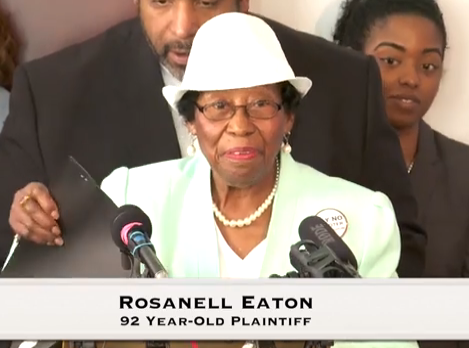Meet the 92-year-old plaintiff challenging restrictive NC voting law

After North Carolina Gov. Pat McCrory (R) quietly signed into law one of the most restrictive voting bills in the nation, civil rights groups filed lawsuits challenging its constitutionality.
Just hours after McCrory approved the bill on Monday, The American Civil Liberties Union, the ACLU of North Carolina Foundation, and the Southern Coalition for Social Justice filed a federal lawsuit targeting provisions of the law that eliminate a week of early voting, end same-day registration, and prohibit out-of-precinct voting. The suit argues that the law would unduly burden the right to vote and discriminate against African-American voters in violation of the U.S. Constitution's equal protection clause and the Voting Rights Act of 1965.
The ACLU/SCSJ lawsuit was filed on behalf of several North Carolinians who will face hardships under the law, and also on behalf of the League of Women Voters of North Carolina, the North Carolina A. Philip Randolph Institute, N.C. Common Cause, and Unifour OneStop Collaborative, a nonprofit that works to increase voter participation in the state's disadvantaged communities.
SCSJ also filed a second lawsuit in state court challenging the law's voter ID provision. That suit claims that under Article 6, Section 1 of the N.C. Constitution, the legislature doesn't have the power to set new voter qualifications. The plaintiffs include college students who won't be able to vote in North Carolina because they have out-of-state driver's licenses and student IDs are not accepted under the new law, as well as elderly residents who were not born in the state and will either have to pay for a birth certificate to get an acceptable ID, which amounts to a poll tax, or won't be able to get one at all, preventing them from voting.
The Advancement Project filed a separate federal suit against the law, alleging that it violates Section 2 of the Voting Rights Act, which bans voting procedures that discriminate on the basis of race, color, or membership in a language minority group. That suit also claims North Carolina's law violates the 14th and 15th amendments to the U.S. Constitution because it "imposes unjustified and discriminatory electoral burdens on large segments of the state's population and will cause the denial, dilution, and abridgment of African-American voters fundamental right to vote."
The Advancement Project filed the suit on behalf of the N.C. NAACP and Mrs. Rosanell Eaton, a 92-year-old African-American woman whose ability to vote is jeopardized by the law. Eaton is a resident of Franklin County, one of the 40 North Carolina counties that was covered under Section 5 of the Voting Rights Act, which required federal pre-clearance of election changes for places with a history of discrimination against minority voters. A recent U.S. Supreme Court decision effectively scrapped Section 5 by striking down Section 4, which set out the formula to determine which jurisdictions were covered by the pre-clearance requirement.
Earlier this year, Eaton told The News & Observer about the difficulties she encountered when she turned 18 and rode in her brother's mule wagon to the county seat of Louisburg to add her name to the voting rolls:
Before she could register, a court clerk explained, "You've got to do a whole lot of things."
Stand against the wall. Arms at your side. Look straight ahead. Recite the preamble to the Constitution without missing a word.
Eaton did as she was told, and the clerk told her mother, "She's a brave little girl.
Speaking at an Aug. 13 press conference about the lawsuit, the longtime NAACP activist said she's "proud to be a plaintiff" in the lawsuit against the bill "because it's absolutely wrong."
"Our rights are being taken away from us," she said, "and we should not stand idle."
Watch the video of her full remarks here:
Tags
Sue Sturgis
Sue is the former editorial director of Facing South and the Institute for Southern Studies.
